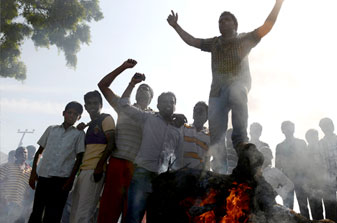 New Delhi, Oct 9: In a move to pacify protesters in the coastal region of the state, the Centre on Tuesday signalled that it would slow the process of splitting Andhra Pradesh, setting up a group of ministers for the bifurcation but not giving it a deadline to submit a report.
New Delhi, Oct 9: In a move to pacify protesters in the coastal region of the state, the Centre on Tuesday signalled that it would slow the process of splitting Andhra Pradesh, setting up a group of ministers for the bifurcation but not giving it a deadline to submit a report.
The Congress party has been caught off balance by the intensity of protests in Seemandhra, the part of Andhra left behind after the government conceded the long-pending demand for the creation of Telangana. Its own chief minister, Kiran Kumar Reddy, has opposed the breakup of the state but refused to quit, virtually daring the party to risk sacking him ahead of general elections next year.
The home ministry had originally proposed a six-week deadline for the GoM to submit its findings, but this did not find favour with a government desperate to show that while it wants to create Telangana, there is still scope to accommodate some demands of the dissenters.
The GoM, likely to be headed by home minister Sushilkumar Shinde, will divide the assets of Andhra and determine the boundaries of Telangana and Seemandhra with reference to electoral constituencies, and split judicial and statutory bodies, and other administrative units.
One reason the Congress wants to split Andhra is to minimise electoral losses in the state after popular leader Jaganmohan Reddy left the party in 2010. It reckons it will sweep a newly created Telangana, and pick up a few seats in a multi-cornered contest in Seemandhra. Telangana will have 17 Members of Parliament and Seemandhra, 25.
But things have gone from bad to worse over the past few days.
"It seems the Centre trusted the state's political leadership to explain the mechanics of the division to the people. But the AP chief minister is trying to sabotage the central decision," said Gautam Pingle, former Director, Center for Public Policy at Administrative Staff College of India.
One of the options before the government is to impose President's rule in the troubled state, though Shinde categorically denied any such move. With elections approaching, the Congress would not like to give the Opposition a stick to beat it with.
There is a precedent of forming a new state under President's rule: Haryana in 1966. But given the bitter feud among pro and anti-Telangana parties, this time such a move will also be vulnerable to a legal challenge.
The Congress started the day by trying to discredit two of its bête noires in the state -- former chief minister Chandrababu Naidu and Jaganmohan Reddy -- by showing they had actually supported the split before professing to oppose it.
Congress spokesperson Digvijaya Singh released letters written by Naidu in 2008 and 2012 and Reddy in 2012 expressing their support for Telangana. The two leaders are on indefinite fasts to protest the bifurcation of the state.
After the announcement of the GoM, Singh appealed to the people of Seemandhra to give up their protests "so that a healthy dialogue process can move forward and a solution that will benefit both the sides be arrived at".





Comments
Add new comment